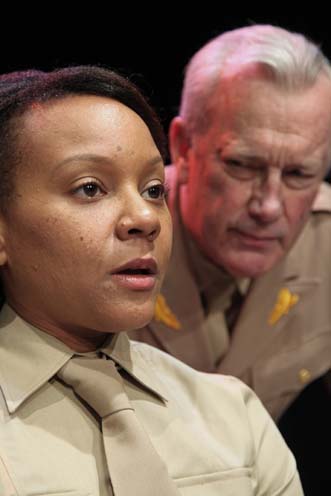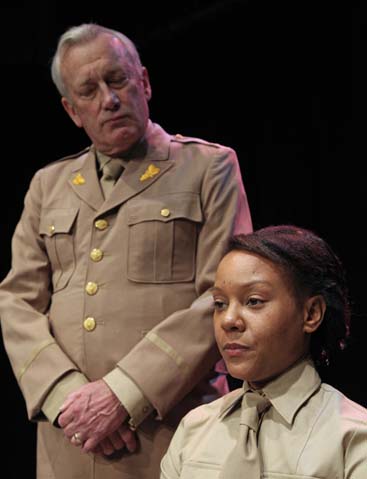
Paulanne Simmons
|
"Court-Martial at Fort Devens"
The history of racism in the United States is so replete with horrific incidents, many of which have been dramatized, that sometimes audiences may be a bit fatigued by the overload. But there are still many stories that need to be told. One such story is that of the court-martial of a group of African American WACs during World War II. The women went on strike because they had been promised in an ad endorsed by First Lady Eleanor Roosevelt that if they enlisted they would be trained in a professional career. These women joined the army hoping to be trained as nurses, but ended up as orderlies mopping floors and cleaning toilets. Playwright Jeffrey Sweet has used transcripts from the trial as well as public comments on the incident to craft a fascinating and moving play that bears testimony to this depressing period in American history. The drama, which premiered at Chicago's Victory Gardens Theater, has now been staged by Woodie King Jr’s New Federal Theatre in association with Castillo Theatre, and is directed by Mary Beth Easley. The four African-American privates are portrayed by Alia Chapman (Ruby), Gillian Glasco (Tenola Stoney), Keona Welch (Gertrude) and Eboni Witcher (Johnnie Mae), while Ginny Boyd, the African-American lieutenant who is brought in to improve race relations, is played by Nambi E. Kelley, and Evander Duck is the African-American lawyer who defends the WACs. Although all these women are in the same boat, Sweet gives each of them qualities that differentiate one from the other, and the acting surely emphasizes these differences, from the heroic Gertrude to the reluctant Boyd, an officer who has much to lose. The other actors play multiple roles, with Bill Tatum in all the white male roles, Emma O’Donnell in all the female white roles and Frank Mayers in all the supporting African-American male roles. Tatum is especially effective as the racist and sexist Colonel Kimball. Mayers shines as the minister whose sermon foreshadows Dr. Martin Luther King Jr. at his best.
The actors perform with the aid of a few props, on a stage that is almost bare. This gives many of the speeches the quality of testimony, even in the scenes that do not concern the actual trial. In this particular case, however, this does not take away from the drama. There can be little doubt that "Court-Martial at Fort Devens" is a play that is meant to educate and motivate. Sweet is clearly more concerned with the events than the characters of the individuals involved in those events. For some, this may detract from the value of the drama. However, Easley’s direction and Sweets thoughtful melding of transcripts with original dialogue, combined with acting that is occasionally inspired make this play a most fulfilling experience. "Court-Martial at Fort Devens" is definitely not limited to school groups. It is a play that should be seen by anyone interesting in American history and how it can be brought to life.
|
| museums | NYTW mail | recordings | coupons | publications | classified |


